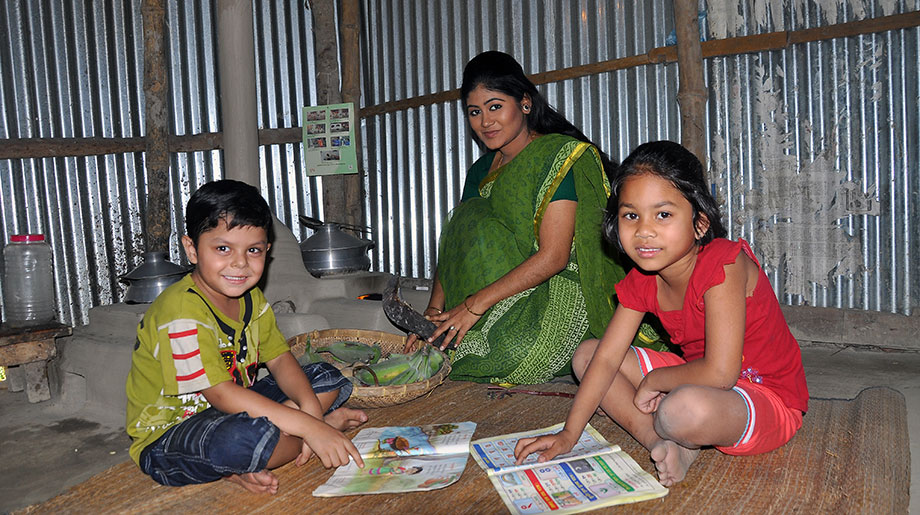Efficient Cook Stoves reduce Emissions in Bangladesh

Project type: Efficient cook stoves
Project location: Bangladesh
Project status: In operation, credits available
Annual emission reduction of the whole project: 50,000 t CO2 (per component project activity)
This climate protection project involves the installation and maintenance of domestic and non-domestic improved cooking stoves in Bangladesh. The stoves have a cleaner burning process and thus decrease indoor air pollution and associated acute respiratory infections in women and children. Moreover, savings in burning unsustainably harvested fuel wood cut down CO₂ emissions and saves forests thus protecting biodiversity.
98 to 99 per cent of Bangladesh rural population burns biomass fuels by using traditional cookstoves, so called “three-stone” cook stoves, for cooking and heating. The inherent inefficiency of such stoves, combined with the high moisture content of biomass cooking fuels, results in incomplete combustion which leads to indoor air pollution causing substantial environmental and health harm.
The replacement of traditional stoves by efficient stoves improves heat transfer, hence reducing the total amount of wood required for cooking and reducing the amount of CO2. The efficient cook stoves are constructed from brick and/or concrete and have provisions like grates and chimney with cap. The improvement in thermal efficiency is achieved by properly designing the dimensions of the combustion chamber and ensuring effective air flow during cooking. They are designed to draw off smoke and toxins, thus creating cleaner indoor air.
Therefore, children and mothers are exposed to fewer air pollutants such as carbon monoxide and particulate matter. Moreover, the stoves require less fuel, which in many areas can be a scarce resource or very expensive to buy. Therefore, the circumstances of poor families improves since the stoves reduce fuel cost or lead to more opportunity for productive activity, arising from less time spent collecting fuel. Also, users have found the new stoves more convenient, shortening the cooking time. The reduction in wood consumption for cooking also reduce deforestation and helps biodiversity as remaining forest reserves in Bangladesh are a vital habitat for flora and fauna.
Cook stove users can undergo the projects “Entrepreneur Programme” training and start their own cookstove building and maintenance business. Shahida did this and currently sells about 30–40 cookstoves a month.
The maintenance and sale of cookstoves gives me an income of about 250–300 USD. With this income I am able to send my three sons and my daughter to school.
The implementing partner of myclimate, SZ Consultancy Services Ltd, has been disseminating this efficient stove model since 2012, having team members across numerous locations in Bangladesh. The programme creates employment opportunities for new stove technicians, assistants, office staff and other related jobs in Bangladesh. Human and institutional capacity is raised through the business development component of the project. The programme as part of its large-scale promotion and advertising has facilitated capacity development among the employed staff. The programme involves theory and hands-on practical training for all team members and also training of new entrepreneurs to take forward the concept and manufacture the product locally. Training exercise includes awareness-building for the locals (potential users) as well as training and trouble-shooting. Last but not least, the introduction of a locally manufactured technology helps to build technological self-reliance.
This project contributes to 8 SDGs (as of end 2022):
Find out how myclimate reports these SDGs in our FAQ.
The following SDGs are verified by the Gold Standard:
87 per cent of stove users report money savings due to a reduction in purchased fuel consumption
87 per cent of stove users report a reduction in smoke and particulate matter
87 per cent of stove users report time savings due to a reduction in time for collecting fuel and cooking
433,000 households benefit from the project
30 jobs created by the project
55 per cent fuel savings reported by stove users
Each stove avoids 0.8 t CO2 per year
280,000 tonnes of firewood saved per year or 2,000 ha of forest saved from deforestation
Situation without project
Higher consumption of non renewable biomassDocumentations
Project standard

Project number
7241












